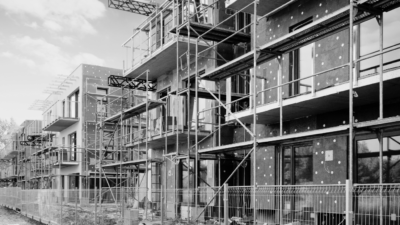The question of what is happening in the economy, and the property market, during this period of lockdown is an interesting one. The Centre for Economics and Business Research (CEBR) recently estimated that 31% of normal economic activity is being lost as a result of the lockdown. Interestingly, for estate agents, both commercial and residential, the figure was only 20%, implying that working from home, virtual viewings and other adaptations are keeping some things going in the market, even at a time when the official advice is to pause exchanges of contract and completions.
The CEBR also found that construction activity was operating at 50% of normal. This was consistent with the latest purchasing managers’ survey for the industry, which in March showed the steepest fall in activity in the sector since April 2009. April 2009, of course, was in the depths of the financial crisis.
Housebuilding activity held up better than civil engineering or commercial work in the survey, though respondents were braced for a sharp drop. Sure enough, led by Barratt Developments and Taylor Wimpey, most of the big housebuilders called a halt to construction activity on their sites in late March.
What does it all add up to for the housing market? Knight Frank, the estate agent, making the assumption that the lockdown will remain in place for the whole of April and May, with a gradual lifting through June – which we can all hope for – predicts that this will lead to a 38% drop in transactions to 734,000 for 2020. That would take the total below that recorded in the financial crisis of 2008-9, when the number was just below 800,000. For something that we were barely aware of just a few weeks ago, this is an extraordinary turn of events. You would have to go back very many years for a lower annual transactions’ total.
There will be a recovery, according to Liam Bailey, Knight Frank’s global head of research, with transactions next year set to be 18% above 2019 levels, and the market went into this crisis in pretty good shape, on the back of a post-election recovery. But roughly half of this year’s missing transactions will be “lost”, he suggests. Some people who were going to move will no longer do so. This makes sense. There will be those, probably quite a number, whose income expectations will have changed for the worse as a result of the crisis.
Knight Frank expects only a modest 3% fall in house prices this year. Lettings activity will be 25% below its average of the past five years but rental values in the London and Home Counties markets it covers will be flat rather than falling, with some upward pressure resuming later in the year.
If that is as bad as it gets, for house prices and rental values, many people will be relieved. There are plenty of gloomier scenarios around, which involve much longer lockdowns and which worry about the absence of a comprehensive exit strategy from a public health crisis which has become an economic crisis.
Even in a lockdown, however, people have to move. Demand for housing does not stop, even when the supply of new-build properties comes to a halt. Second homes may be out of bounds, as Scotland’s chief medical officer discovered to her cost, but things have not completely ground to a halt.
The lockdown itself may also be generating its own demand. Some delving by the tradespeople comparison site HaMuch, based on a trawl of lettings websites, found a strong demand for rental properties with gardens, as people try to make isolation more palatable.
The strongest demand for rental properties with gardens was in Bristol, followed by Nottingham, London and Cambridge. It is an ill wind that does not blow somebody some good.
























Comments